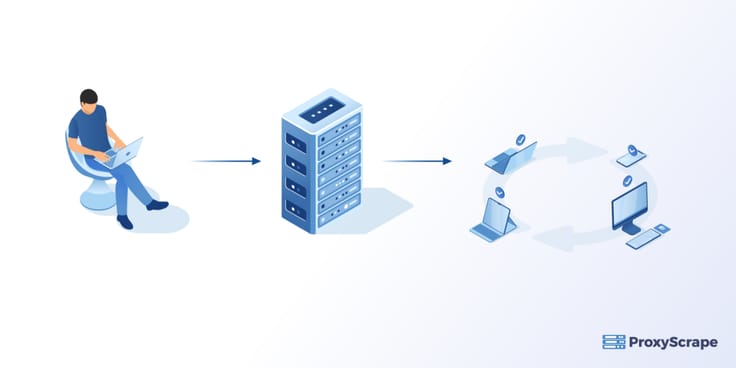
Before diving into the details of proxies, we must know what proxies are and how to create a proxy in python. Proxies are a gateway or a tunnel between the user and the Internet. They act as a firewall providing shared network connections and cache data to speed up common requests. A good proxy server
Before diving into the details of proxies, we must know what proxies are and how to create a proxy in python. Proxies are a gateway or a tunnel between the user and the Internet. They act as a firewall providing shared network connections and cache data to speed up common requests. A good proxy server keeps the internal network and the users protected from the wild Internet’s bad stuff, thus providing security, privacy, and a lot more, depending on the users’ needs.
Let’s understand how a proxy server acts as a security protection device between the server and client computers with the help of an example.
Consider “X” as a client computer, “Y” as a server computer, and “Z” as a proxy server. Whenever “X” wants to request or send something to “Y” directly, “Y” can quickly identify “X” as the sender of the request and gather information about “X.” But what if “X” is first connected to the proxy server “Z”? In this scenario, if “X” requests or sends something to “Y” via “Z,” then “Y” will not be able to identify “X” as the sender of the request.
Therefore, it can collect information only about “Z.” This way, “X” can hide and protect its personal information from “Y” by taking the help of the proxy server “Z.” This is how a proxy server behaves like a privacy shield and hides the client’s information.
Table of Contents
- The Need For Proxies:
- How to Create a Proxy In Python- Easy Steps:
- Import Libraries:
- Get Requests:
- Removing the URL slash
- Sending The Headers
- Using The TCP Server:
- Types Of Proxy Servers:
- Anonymous Proxy: Advantages Of Using An Anonymous Proxy
- Advantages Of Using An Anonymous Proxy
- Rotating Proxies:
- Uses Of Proxies:
- The Best Proxy for Your Online Tasks:
- FAQs:
- Final Thoughts:
The Need For Proxies:

Companies must gather large amounts of data to promote their causes in today’s world. It’s frustrating for companies when they discover they can not get crucial information, especially when they need it fast. The reason is that some websites restrict scraping as our actual IP address is from a banned geographical zone.
Another reason a company’s server can not scrap sites could be that they are trying to scrap restricted data or using a prohibited device.
Keeping in view the above scenario, it becomes evident that we need a way to conceal our IP address to scrape any website of our choice for our business requirements. That’s where a proxy comes in. It is a third-party server that connects our computer to the Internet using a pseudo IP address.
How to Create a Proxy In Python- Easy Steps:
To create a proxy server in Python, you need to follow the steps given below.

Import Libraries:
You have to import the following libraries.
- A SimpleWebSocketServer
- A simple_http_server
- urllib
from simple_websocket_server import WebSocketServer, WebSocket
import simple_http_server
import urllib
PORT = 9097The SimpleWebSocketServer and the simple_http_server listen to the incoming requests, and the urllib module fetches the target web pages.
We can also initialize the port, as shown below.
Get Requests:
For creating our own proxy, we inherit SimpleHTTPRequestHandler. We define a function do_GET that will be called for all GET requests.
class MyProxy(simple_http_server.SimpleHTTPRequestHandler):
def do_GET(self):
url=self.path[1:]
self.send_response(200)
self.end_headers()
self.copyfile(urllib.urlopen(url), self.wfile)Removing the URL slash
The URL that we pass in the above code will have a slash (/) at the beginning from the browsers. We can remove the slash using the below code.
url=self.path[1:]Sending The Headers
We have to send the headers as browsers need them for reporting a successful fetch with the HTTP status code of 200.
self.send_response(200)
self.end_headers()
self.copyfile(urllib.urlopen(url), self.wfile)We used the urllib library in the last line to fetch the URL. We wrote the URL back to the browser using the copyfile function.
Using The TCP Server:
We will use the ForkingTCPServer mode and pass it to the above class for interrupt handling.
httpd = WebSocketServer.ForkingTCPServer(('', PORT), MyProxy)
httpd.serve_forever()You can save your file as ProxyServer.py and run it. Then you can call it from the browser.
Your whole code will look like this.
from simple_websocket_server import WebSocketServer, WebSocket
import simple_http_server
import urllib
PORT = 9097
MyProxy(simple_http_server.SimpleHTTPRequestHandler):
def do_GET(self):
url=self.path[1:]
self.send_response(200)
self.end_headers()
self.copyfile(urllib.urlopen(url), self.wfile)
httpd = WebSocketServer.ForkingTCPServer(('', PORT), MyProxy)
print ("Now serving at" str(PORT))
httpd.serve_forever()Types Of Proxy Servers:
There are various proxy servers, but not all work the same way. You need to understand the functionality you can get from a particular proxy server. Other than the datacenter and residential proxies, some of the proxy servers are:
Anonymous Proxy:
Whenever we type an address on our browser, our device sends a request to the web host of our destination website. When the web host receives the request, it sends the web page of our target website back to our device.
The web host only sends the page back to us if it knows our internet protocol, i.e., IP address. Thus, the target website knows the general location from where we are browsing because we sent out our IP address when we requested to browse the website.
Most likely, the web host may be able to access our ISP (Internet Service Provider) account name with the help of our IP address.

Advantages Of Using An Anonymous Proxy
There are lots of advantages to using an anonymous proxy server. We must be aware of its benefits to understand how it can help us in our organization or any business. Following are some of the pros of using anonymous proxy servers:
- The most obvious benefit of anonymous proxy servers is that they give us some semblance of privacy. It essentially substitutes its IP address in place of ours and allows us to bypass geo-blocking. For instance, a video streaming website provides access to viewers of specific countries and blocks requests from other countries. We can bypass this restriction by connecting to a proxy server in any country to access the video streaming website.
- Public WiFi may prevent us from browsing certain websites at some universities or offices. We can get around this browsing restriction by using a proxy server.
- An anonymous proxy server helps clients protect their vital information from hacking.
- A proxy server is often used to access data, speeding up browsing because of its good cache system.
Rotating Proxies:
We can define proxy rotation as a feature that changes our IP address with every new request we send.
When we visit a website, we send a request that shows a destination server a lot of data, including our IP address. For instance, we send many such requests when we gather data using a scraper( for generating leads). So, the destination server gets suspicious and bans it when most requests come from the same IP.
Therefore, there must be a solution to change our IP address with each request we send. That solution is a rotating proxy. So, to avoid the needless hassle of getting a scraper for rotating IPs in web scraping, we can get rotating proxies and let our provider take care of the rotation.

Uses Of Proxies:
Some of the critical uses of proxies are mentioned below:
- Web Scraping
E-commerce websites employ anti-scraping tools for monitoring IP addresses to detect those making multiple web requests.
It is where the use of proxies comes in. They enable users to make several requests that have ordinarily been detected from different IP addresses.
Each web request is assigned a different IP address. In this way, the webserver is tricked and thinks that all the web requests come from other devices.
- Ad Verification
Ad verification allows advertisers to check if their ads are displayed on the right websites and seen by the right audiences.
The constant change of IP addresses accesses many different websites and thus verifies ads without IP blocks.
- Accessing geo-restricted websites and data
The same content can look different or unavailable when accessed from specific locations. The proxies allow us to access the necessary data regardless of geo-location.

Suggested Reads:
The Top 8 Best Python Web Scraping Tools In 2023How To Make A Proxy Checker In Python
The Best Proxy for Your Online Tasks:
ProxyScrape is one of the most popular and reliable proxy providers online. Three proxy services include dedicated datacentre proxy servers, residential proxy servers, and premium proxy servers. So, what is the best possible solution for a best alternate solution for how to create a proxy in python? Before answering that questions, it is best to see the features of each proxy server.
A dedicated datacenter proxy is best suited for high-speed online tasks, such as streaming large amounts of data (in terms of size) from various servers for analysis purposes. It is one of the main reasons organizations choose dedicated proxies for transmitting large amounts of data in a short amount of time.
A dedicated datacenter proxy has several features, such as unlimited bandwidth and concurrent connections, dedicated HTTP proxies for easy communication, and IP authentication for more security. With 99.9% uptime, you can rest assured that the dedicated datacenter will always work during any session. Last but not least, ProxyScrape provides excellent customer service and will help you to resolve your issue within 24-48 business hours.
Next is a residential proxy. Residential is a go-to proxy for every general consumer. The main reason is that the IP address of a residential proxy resembles the IP address provided by ISP. This means getting permission from the target server to access its data will be easier than usual.
The other feature of ProxyScrape’s residential proxy is a rotating feature. A rotating proxy helps you avoid a permanent ban on your account because your residential proxy dynamically changes your IP address, making it difficult for the target server to check whether you are using a proxy or not.
Apart from that, the other features of a residential proxy are: unlimited bandwidth, along with concurrent connection, dedicated HTTP/s proxies, proxies at any time session because of 7 million plus proxies in the proxy pool, username and password authentication for more security, and last but not least, the ability to change the country server. You can select your desired server by appending the country code to the username authentication.
The last one is the premium proxy. Premium proxies are the same as dedicated datacenter proxies. The functionality remains the same. The main difference is accessibility. In premium proxies, the proxy list (the list that contains proxies) is made available to every user on ProxyScrape’s network. That is why premium proxies cost less than dedicated datacenter proxies.
So, what is the best possible solution for the best alternate solution for how to create a proxy in python? The answer would be “residential proxy” and “dedicated datacenter proxy” The reason is simple. As said above, the residential proxy is a rotating proxy, meaning that your IP address would be dynamically changed over a period of time which can be helpful to trick the server by sending a lot of requests within a small time frame without getting an IP block.
Next, the best thing would be to change the proxy server based on the country. You just have to append the country ISO_CODE at the end of the IP authentication or username and password authentication.
Datacenter proxy is blazing fast, and if you are an avid movie buff, then a datacenter proxy is the best companion to stream high-quality videos.
FAQs:
1. How to create a proxy in python in 2023?
2. What are the uses of proxies?
3. What is the best proxy to use?
Final Thoughts:
We discussed those proxy servers are relays between the client and the server machine. We can use them to monitor and filter the internet traffic. Proxies can also filter out unwanted content and give businesses more control over their networks. We can use them to scrape the web and access geo-restricted data. Other than anonymous and rotating proxies, the residential and the datacenter proxies give us access to blocked content and web pages. They are widely used as they are ideal for many applications and offer us adequate privacy.